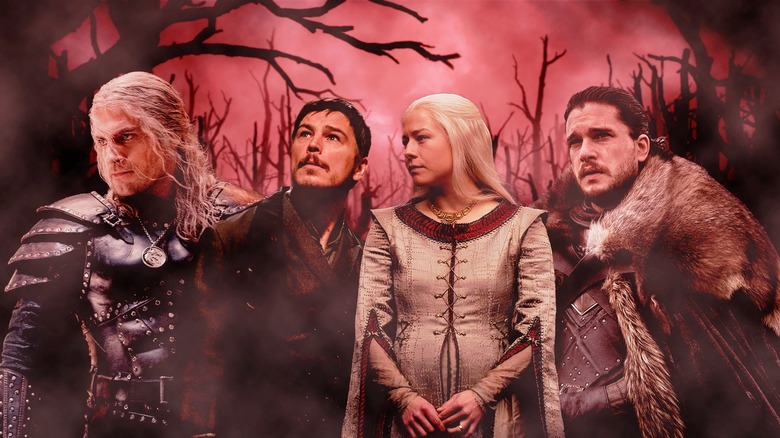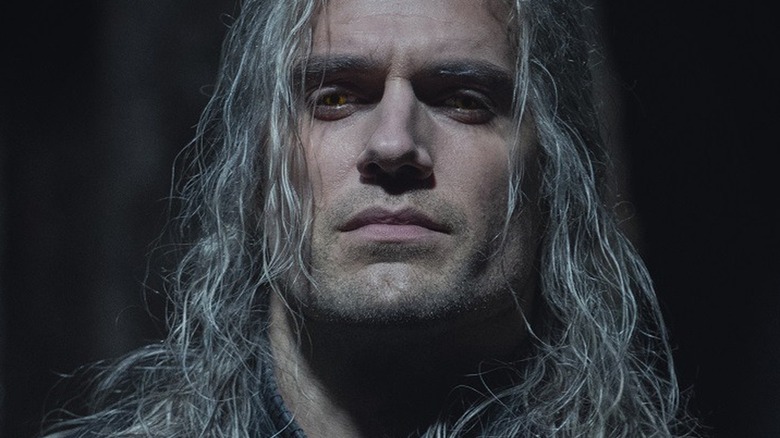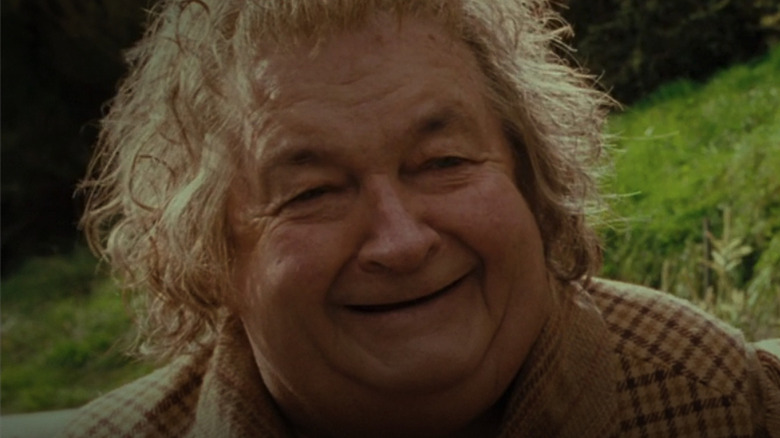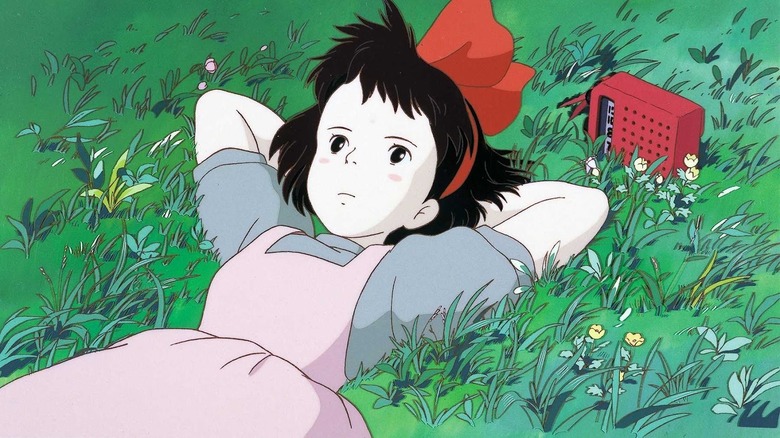An Entire Fiction Genre Emerged In Response To Game Of Thrones-Style Epics, And It Will Be The Future Of Fantasy TV
It's been over 10 years since "Game of Thrones" premiered on HBO and changed the landscape of television forever. Over the course of its eight-season run, the fantasy series, based on George R.R. Martin's "A Song of Ice and Fire" novels, became watercooler talk for fans all over the world. More interestingly, though, "Game of Thrones" propelled grimdark fantasy stories into the big time.
From the infamous Red Wedding to the general dispatching of major characters, "Game of Thrones" is full of shocking moments that go to some pretty extreme places. Westeros is a savage world, populated by morally ambiguous characters who love coitus, violence, and other forms of naughty behavior. Other fantasy series that followed in its wake boasted similar sensibilities, though "Game of Thrones" and its spin-off, "House of the Dragon," remain the benchmark for grimdark on the screen.
That said, the world of television goes through cycles, and the "Game of Thrones" buzz won't last forever. There will come a day when viewers tire of watching challenging fantasy epics and go looking for breezier alternatives. This has already happened in literature, as a burgeoning movement has emerged in response to grimdark fare — and it's only a matter of time until it's the hip thing on television.
What is grimdark?
The term "grimdark" originates from the "Warhammer 40k" tabletop game, which uses the tagline, "In the grim darkness of the far future, there is only war." In short, it's a subgenre of fantasy fiction that favors hyperrealistic worlds, morally grey characters, and general depravity. Glen Cook's "The Black Company," released in 1984, is often credited as the first grimdark story. It follows a group of hardened mercenaries as they navigate a wartorn world, and, despite its fantastical elements, the book has been praised for its realistic depiction of soldier life (per Tor).
Elsewhere, Joe Abercrombie, Steve Erickson, R. Scott Bakker, Mark Lawrence, and George R.R. Martin are widely regarded as some of the most influential authors in grimdark fiction. However, Martin is arguably the only writer who's truly infiltrated the mainstream, based on the success of "Game of Thrones" and the exposure it's given to his novels and celebrity profile. Still, don't be surprised if Martin's peers' stories find their way to the small screen at some point.
If you want to go back further, however, early 20th-century pulp stories by Robert E. Howard can be considered grimdark. "Conan the Cimmerian," "Solomon Kane," and "Kull the Conqueror" reject the noble idealism that was commonplace in early fantasy stories in favor of hard-boiled storytelling. Howard's "heroes" are barbarians and savages who inhabit cruel, violent worlds; cold warriors who are more interested in their own survival than saving humanity. Howard's stories are grim, gritty, and brutal, and their influence on grimdark fiction can't be overlooked.
Grimdark was a necessary response to traditional fantasy epics
Grimdark has been described by some scholars as the antithesis of J.R.R. Tolkien's "The Lord of the Rings" brand of fantasy. In the '80s and '90s, when grimdark truly rose to prominence, best-sellers such as Raymond E. Feist's "The Riftwar Cycle" saga and Robert Jordan's "The Wheel of Time" series were still promoting the Tolkien school of thought, giving readers spirited adventure yarns about the clear-cut battle between good and evil. These are fantastic fantasy stories in their own right, but their edgier elements are softened by their uplifting themes. Grimdark was a reaction to this trend, and it allowed writers to explore thought-provoking ideas that represented the darker side of humanity.
Are fantasy stories escapist entertainment? Sure. That said, most works of fiction are inspired by and reflect real-world events to some degree; as such, the best grimdark yarns explore the complexities of human nature and tap into sociopolitical issues that affect our everyday lives. For example, "A Song of Ice and Fire" was inspired by brutal historical events such as The War of the Roses, a series of conflicts over the English throne that brought the country to its knees in the 15th century. In addition, these novels, and their HBO adaptations, address contemporary issues such as social inequality, sexism, climate change, war, politics, and other anxieties.
Of course, grimdark tales are also useful for catering to fantasy fans who want darkness and violent thrills in the fiction they consume. Regardless of their intention, stories of this ilk are necessary for ensuring that the genre offers something for everyone.
The rise of grimdark on television
After "Game of Thrones" took the world by storm, networks and streaming services got in on the fantasy craze. Amazon Studios gave us traditional fare in the form of "The Lord of the Rings: The Rings of Power" and "The Wheel of Time." HBO, meanwhile, complemented "Game of Thrones" and "House of the Dragon" with an adaptation of the young adult fantasy series "His Dark Materials."
Unsurprisingly, fans of grimdark haven't been underserved either. Showtime's "Penny Dreadful" is a period piece that features gross monsters, violence, erotic scenes, and morally dubious characters. Netflix has also claimed a tasty slice of the pie with "The Witcher," a gore-soaked adaptation of Andrzej Sapkowski's seminal series of the same name. These shows wouldn't exist if "Game of Thrones" didn't create an appetite for grimdark on the small screen.
"Penny Dreadful" and "The Witcher" are more fun and accessible than "Game of Thrones" and "House of the Dragon," but they've certainly contributed toward pop culture's current fascination with the dark side of fantasy. At the same time, some fantasy fans don't want darkness in their entertainment, and a new movement has risen to satisfy their needs.
The emergence of cozy fantasy
Most human beings can only tolerate so much darkness before they need to return to the light. Violent fantasy tales that provide high-stakes action and despair are great, but we also need feel-good, breezy alternatives that instill comfort and joy. Fortunately, cozy fantasy is the storytelling equivalent of a warm hug.
Similar to hopepunk — a subgenre and literary movement that promotes kindness, radical change, and hope during dark times — cozy fantasy is optimistic. However, hopepunk tales tend to revolve around high-stakes scenarios, while cozy fantasy stories are lowkey, pleasant, slice-of-life affairs. There is potential for conflict, sure, but not in the apocalyptic sense; instead, characters overcome small hurdles, such as keeping their magical bookstores open and/or winning the affection of their crushes. A good example is Travis Baldree's "Legends and Lattes," which tells the story of an Orc who gives up a life of epic adventure to open a coffee business.
Cozy fantasy is a recent phenomenon in literature, though its roots can be traced back to the early days of fantasy. The Shire sequences in "The Hobbit" and "The Lord of the Rings" books transport readers to an idyllic corner of Middle-earth that's populated by friendly creatures. Grumpy farmers and running out of ale are the only problems on the minds of Shire folk, and their humble way of life is undeniably cozy. We need more stories like this, without evil Ringwraiths showing up to spoil the party.
Cozy fantasy is the future of television
Hollywood is still riding the grimdark craze like it's Daenerys Targaryen soaring through the skies on Drogon. In recent months, the popularity of series such as "The Witcher: Blood Origin" and "House of the Dragon" suggest that hard-edged fantasy epics are still a hot commodity in the eyes of influential decision-makers. Elsewhere, Amazon Studios is working on a "Warhammer 40k" series that will combine elements of grimdark and sci-fi. Mark Lawrence's "Broken Empire" and Nicholas Eames' "The Band" have also been optioned for television (per Tor), but it remains to be seen if these projects will come to fruition.
Fans of cozy fantasy might have to be patient for the subgenre to take over television and streaming. Outside of Studio Ghibli and likeminded anime, it's practically non-existent on the screen. At some point, though, a series will come along and create a seismic shift in pop culture, similar to the impact "Game of Thrones" had on society back in 2011. When that day comes, Hollywood will be all over cozy fantasy stories like they're going out of business.
Hollywood has always been years behind the trends of the literary world; grimdark existed for decades before "Game of Thrones" made networks and streaming services acquire other dark fantasy IPs. In the meantime, there's a rich world of cozy fantasy fiction out there that's waiting to be discovered by more people, and it's the perfect reading material to distract us from real-life despair.





